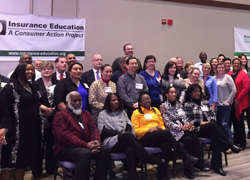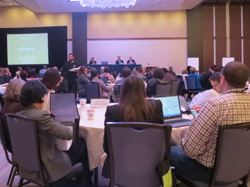Consumer Action’s 2017 National Consumer Empowerment Conference
2017 National Conference Program Book
Last month, credit, housing and financial counselors from non-profits and community-based organizations (CBOs) across the country gathered in Chicago for Consumer Action’s 8th annual National Consumer Empowerment Conference.
The conference kicked off with a frank assessment by the attending national consumer advocacy groups, including Public Citizen and the Center for American Progress, about the many consumer protections at risk in what has become a new era of deregulation. Advocates lamented recently repealed pro-consumer initiatives like the Federal Communications Commission’s (FCC) rule on internet privacy (which would have given the public some control over access to their online data) and the Consumer Financial Protection Bureau’s (CFPB) rule on forced arbitration (which would have allowed consumers to band together to sue a company accused of wrongdoing). The panel also pointed out other protections (regarding student loan repayment, net neutrality and retirement advice) that remain in a state of limbo as federal agencies debate their fate. Advocates advised participants to encourage consumers to call their congressional representatives to voice their concerns about the ongoing loss of consumer protections and to hold lawmakers accountable. (You can use Consumer Action’s Take Action tool to contact your reps.)
The conference then turned to controversial energy efficiency loans. Attendees heard stories of elderly long-term homeowners who qualified automatically for unaffordable Property Assessed Clean Energy (PACE) program loans that brought them to the brink of foreclosure. PACE loans are used to install insulated windows and solar panels and are repaid as an assessment on a homeowner’s property tax bill. There is hope when advocates work to control PACE loans in their state: Realtors, lenders and consumer advocates joined together to pass much-needed legislation in California this year to require that lenders disclose PACE loan costs upfront, consider borrowers’ ability to repay the loans and clearly explain how loans are financed.

Another session described the challenges surrounding the “gig” economy, a growing labor market offering short-term contract or freelance work as opposed to permanent jobs. Approximately one-third of workers are part of the gig economy these days (getting work through companies—“platforms”—like Uber, etc.), with 16 percent operating full-time as so-called independent contractors. While there are pros to working in the gig economy (like flexible scheduling), these workers can suffer from a lack of employer-paid benefits. Presenters promoted the idea of “portable” workers’ compensation or other benefits that travel with a worker to different jobs.
Additional sessions included one hosted by privacy advocate Pam Dixon, who warned of a “modern form of redlining” that occurs when unregulated aggregated risk scores are created about consumers based on where and what they’ve purchased over time using their credit cards. Dixon says these scores draw conclusions about us related to our race, religion, marital status and census tracts. She recommended that we regain some control over our data profiles by opting out of data sharing where possible. See the World Privacy Forum’s Top 10 Opt Outs list.
Another panel included an America Saves representative discussing the campaign to get young people into the habit of saving for expected and emergency expenses by partnering with employers to set up automated savings plans. Participants also heard about how autos with unrepaired safety defects can still legally be advertised as “safe” or “certified” and sold to consumers without repair. (Check for safety defects at SaferCar.gov before buying your next used car.)
The highlight of the conference came as day one wrapped up, with attendees breaking into teams to present their “wow and how” moments—key takeaways from the day’s sessions that wowed them, with thoughts on how they would present the information to their communities. CBOs drew pictures, designed learning games, created skits and entertained each other with new financial warnings and tips.

This year, two top members of the CFPB presented at the conference. The head of the Office of Servicemember Affairs shared some just-in-time tools that the agency created to help financially vulnerable servicemembers avoid being bilked. These included the Bureau’s online financial education comic book, Misadventures in Money Management. Another CFPB representative explained how essential consumers’ financial complaints are to the Bureau’s mission and informed attendees about some key enhancements to its complaint process (such as its new feedback survey, which asks consumers if a company has addressed their complaints and gives them space to explain if a firm did what it said it would do).
Day two of the conference included a session on organizations’ successes in improving access to credit for low-to-moderate income consumers. Two advocates explained how their organizations used the Community Reinvestment Act (CRA) to negotiate with lenders to provide new loans, bank branches and small business investments to meet the credit needs of local communities. Attendees also learned how consumers can “trick themselves into saving” with some of the latest apps that encourage budgeting and good financial habits using FinTech tools; and how “earn and learn” apprenticeship programs can help people earn associate’s degrees—and salaries—while gaining on-the-job learning experience from companies that benefit by reducing their hiring costs. Companies cover apprentices’ college costs, too. (Learn more here.)
Consumer Action appreciates the corporate sponsors, including Citi, TracFone, 1-800 Contacts, JPMorgan Chase, Microsoft, Comcast NBCUniversal, American Express, Enterprise, Walmart and Wells Fargo, whose donations allow CBOs to attend the National Consumer Empowerment Conference at no cost.



